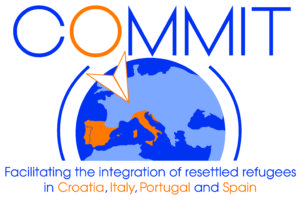
![]()
![]()
![]()
![]()
![]()
“COMMIT: Facilitare l’integrazione dei rifugiati reinsediati in Croazia, Italia, Portogallo e Spagna” è un progetto finanziato dall’UE implementato dall’IOM in collaborazione con il Consorzio Communitas, la Fondazione Adecco per le Pari Opportunità e l’Università per Stranieri di Siena.
COMMIT cerca di dare un contributo all’integrazione sostenibile dei rifugiati reinsediati nelle loro nuove comunità in Croazia, Italia, Portogallo e Spagna, con un focus specifico sull’integrazione di gruppi vulnerabili come donne e giovani.
Si intende raggiungere l’obiettivo generale del progetto attraverso le seguenti azioni specifiche:
Il Consorzio Communitas è responsabile della parte relativa la mentorship di comunità che prevede l’individuazione, la formazione e il monitoraggio di gruppi di mentor in Croazia, Italia e Spagna. L’inclusione sociale dei rifugiati reinsediati si basa attualmente sull’intervento professionale degli operatori dei progetti di accoglienza. Oltre a questo tipo di intervento, istituzionalizzato e professionale, possiamo aggiungere quello dei volontari che in questo contesto di riferimento diventa cruciale: l’attività di mentoring può concretamente supportare i rifugiati nel loro percorso di integrazione.
“COMMIT: Facilitating the integration of resettled refugees in Croatia, Italy, Portugal and Spain” is an EU funded project implemented by IOM in collaboration with Consorzio Communitas, Adecco Foundation for Equal Opportunities and the University for Foreigners of Siena.
Based on these assumptions, COMMIT seeks to contribute to facilitating the sustainable integration of resettled refugees in their new communities in Croatia, Italy, Portugal and Spain, with a specific focus on the integration of vulnerable groups such as women and youth.
The action’s overall objective will be achieved by:
Enhancing pre-departure orientation (PDO), including by mainstreaming vulnerability in PDO curricula, strengthening PDO trainer’s knowledge on reception contexts, and enabling contacts with reception community members since the pre-departure phase;
Systematizing community support, including through building the capacities of key stakeholders in receiving communities and piloting community mentorship schemes with specific attention to supporting vulnerable groups;
Fostering transnational exchange between newer and more experienced resettlement countries to identify and disseminate lessons learnt and best practices beyond the project’s geographical scope.
Consorzio Communitas is responsible for the project component which foresees the constitution of community mentor groups in receiving communities in Croatia, Italy and Spain. The social inclusion of resettled refugees is currently based on the professional intervention of the operators of the reception projects. In addition to this type of intervention, institutionalized and professional, we can add the one of volunteers who in this reference context becomes crucial: the mentoring activity can concretely support refugees in their integration path.
Unisciti a una comunità che vuole fare la differenza nella vita rifugiati: DIVENTA UN MENTORE!
Join a community that wants to make the difference in the lives of refugees: BECOME A MENTOR!
Il mentoring garantisce ai rifugiati che c’è qualcuno che si prende cura di loro, assicura loro che non sono soli nel gestire le sfide quotidiane e li fa sentire come se fossero importanti. La ricerca conferma che le relazioni di mentoring di qualità hanno potenti effetti positivi sia sotto il profilo personale che professionale: ha la potenzialità di collegare un rifugiato alla crescita e allo sviluppo personale e alle opportunità sociali ed economiche.
Mentoring guarantees to refugees that there is someone who cares about them, assures them they are not alone in dealing with day-to-day challenges, and makes them feel like they matter. Research confirms that quality mentoring relationships have powerful positive effects in a variety of personal and professional situations: mentoring connects a refugee to personal growth and development, and social and economic opportunity.
Attraverso la relazione con il mentore, si intende sostenere i rifugiati nel farsi strada attraverso questo periodo di transizione. Contribuendo ad aumentare la loro capacità di partecipare e portare un apporto alla nuova società, il mentore li aiuterà a raggiungere un senso di normalità e benessere. L’obiettivo del mentore dovrebbe essere quello di migliorare la capacità del rifugiato di prendere parte con successo alla vita e alla cultura della sua comunità di appartenenza.
Through partnership with a mentor, iwe want to see refugees empowered to work their way through this transition. By helping to increase their capacity to participate in and contribute to the new society, the mentor will help them attain a sense of normalcy and wellbeing.
The goal of the mentor should be to enhance the ability of the refugee to successfully take part in his own community life and culture.
Pensa a te stesso, se credi di:
Allora puoi candidarti oggi per diventare un mentore!
Procedura di selezione
Think about yourself, if you believe to:
Then you can apply to become a mentor today!
Selection procedure